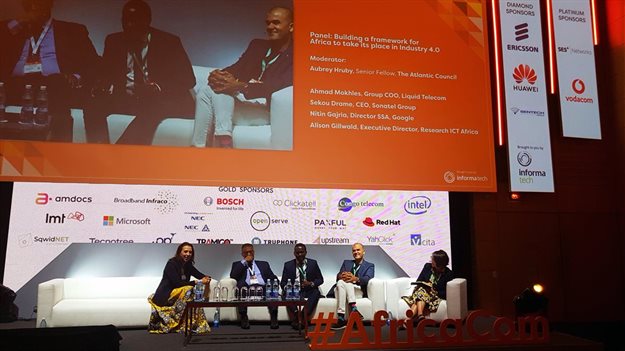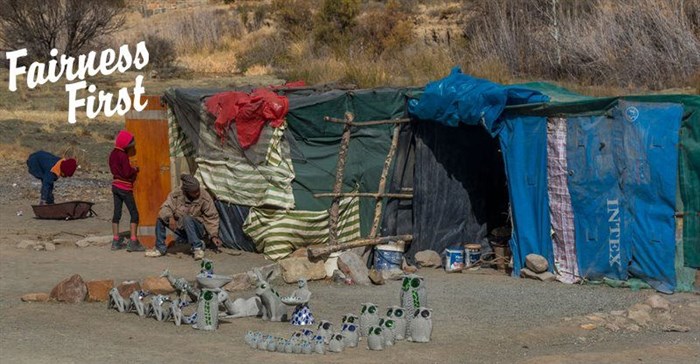
Aubrey Hruby, author and investment advisor of Africa Expert Network, served as chair and MC for the second day of AfricaCom.
Offering a snapshot of where we find ourselves, Hruby shared that while she's based in Washington, she has worked in 35 African countries over the past 18 years. As a result, she's well aware of the fact that we're living in a time where we face one of the largest challenges in history – job creation in African markets.
Giving some shape and colour to the problem, Hruby said many of the jobs we create today may not look like jobs of the past.
Up to 90% of them will be created in the informal sector, Hernando De Soto wrote almost 80 years ago of capital being locked up, yet that prescription for the formal sector has failed. Hruby adds that we have 'failed at formalising the informal sector'.
For example, Kenya's unemployment figures for the past decade, show that of new jobs created, just 15% to 17% are in the formal sector.
That’s the reality we face, but it's not necessarily a bad thing.
Not only are African markets informal, but the gig economy is changing how jobs are looked at, period. When we look to informal trade, Hruby adds that today, many have a 9 to 5, a 5 to 9 and a weekend job on this, the ‘side-hustle’ continent.
So instead of aiming at moving all of that to the formal sector, how can we make the work that's being done more productive?
This is largely a young and urban population so traditional ways of work don't necessarily appeal to them.
Hruby spoke of the creative sector as a good place to start, as it's about creating non-rival goods we can watch locally and export for further consumption.
She says the world has never been more ready to absorb African creative products, with Nigeria's Nollywood film production proving itself invaluable when it comes to job creation.
Hruby then introduced her panel guests, who shared their ideas on what we need to take this momentum forward.
Framing the current challenge of the time, of whether data is too expensive, Dr Alison Gillwald, executive director of Research ICT Africa, said that their African Mobile Pricing Index has done considerable work on pricing as a precondition for the digital economy to take off.
Even where we have low prices, like in Nigeria and Mozambique, data and smartphones are still largely unaffordable and comprise a big portion of the population's 'non-income' spend, so we need new ways to get those costs down.
Gillwald says bringing in community networks and niche players could assist.
While the biggest barrier is the cost of devices, bigger challenges lie in the innovation models. Aside from affordability of device and data, we need to consider the quantity and quality of time spent online.
It's a tiny figure overall, even affecting models of internet penetration on economic growth as the value of network effects is just not there.
It's the classic human development challenge - we're lacking in digital skills and digital literacy.Unfortunately, the digital equality paradox holds true: As you connect more people, the gap widens between those who are barely online and only consuming content passively and those who are using the online content productively for their own prosperity.
It's no longer just about the gap between those who are online and those who are not.
Nitin Gajria, SSA director of Google, has only been based on the continent for three months but said from Google’s perspective, we simply can’t have a digital revolution without access to data. The only way to increase that is through ensuring more widespread, free access to the internet.
Google is putting this into action by launching the new Google Station service across 135 sites across the Western Cape.
While that's a good start, Gajria also asks what education models we need to build, to enhance digital literacy.
Gajria has spent much of his life in India and shares that Vietnam experienced severe access challenges a few years ago. When these were solved, it wasn’t about applying existing Western models, instead, it was about becoming more sophisticated.
Digital upskilling is important to get people started, but we also need to create an innovation mindset to solve African problems in Africa.
India has succeeded in lowering data costs and when online usage was investigated, it was found that India’s leisure economy rules, even among the less affluent, with 'watching Bollywood' and 'downloading sport' featuring highly on the list across the board.
As a result of this, YouTube became one of the largest search engines on the subcontinent across mobile and desktop, also in local language first, which creates further opportunities in the local sector.
Sekou Drame, CEO of Sonatel Group, said Orange is investing a lot to bring data services to customers, having increased 3G coverage in Senegal to 80% and at 20% for 4G, to ensure the digital revolution happens.
He said it's not only fragmentation of markets that need to be factored in, but also the need for frequency adjustments and the fact that there isn't consistent regulation across the continent.
The lack of electricity in some regions is another concern, as that’s basic infrastructure.
Drame said that's why they believe in being more than just a telecoms operator, with Orange Money serving 45m customers.
They're aiming to create a true digital economy in the opening of Orange digital centres and free coding schools, while also running programmes for startup development and partner with local players to further enhance the ecosystem.
Ahmad Mokhles, group COO of Liquid Telecom, said the basic infrastructure is crucial in co-creating the ecosystem. He also pointed out that business models are evolving so it’s actually a digital evolution, not a revolution.
He adds that it's largely the Western world that would like to see Africa shift from its largely informal trading mindset to the more formal model, but he does not see this happening, as doing so would mean stepping back to a processing rather than innovating industry.
Gillwald added that old assumptions around competitive markets are obsolete as people who can afford to do so are paying for quality.
She spoke of the #datamustfall movement, where many customers migrated from Cell C and Telkom to Vodacom and MTN, as quality is as critical in a competitive market as the price.
Simply put, there hasn't been effective competitive regulation in the industry, and the dominance of big players in market means the smaller players effectively can’t compete.
Looking further afield, Gajria mentioned that Rwanda still doesn't have basic money services in place and needs to be grounded in economic realities. He said this is a conversation that needs to be explored deeper.
Once more people are online, will we leverage that to create economic opportunities and create a virtuous circle instead of a vicious one?
We also need to address questions relating to the next generation: Are there enough kids in Stem education? Probably not. How do we nurture digital literacy and skills once the infrastructure is in place?
Gajria said that Google’s CS First educational programme brings in the primary school coding as it's not just about providing access, or digital literacy so that they know the various services that can be used online, but upskilling the next generation to co-create the digital future.
We can't just build the highway then sit back thinking our job is done. We also need to train the drivers who will travel that highway.We also don’t have the luxury of doing this sequentially, said Gillward.
It's difficult as the inequalities we see here reflect the inequalities of the continent. We need different interventions to create an investment environment that will incentivise free public Wi-Fi across the continent.
On the education front, just think of how the Harambee Employment Accelerator in South Africa has connected 500,000 learners with 50,000 companies.
Hruby closed the panel with a final question on each panellist's short-term forecast on the availability of Wi-Fi and access in Africa, as well as a comment on one thing we're all still getting wrong.
Gillward said in policy and regulatory terms, 24 months is seen as short. There are interesting developments taking place but her biggest concern is the distraction of the current 4IR hype, and the resulting disruption of policy and processes that were underway.
Many markets continue with ineffectively regulated competition and price wars that don’t benefit anyone, as most people still can’t afford them, nor do they have access in rural areas.
To get around this, Gillward says we need to review what we’ve got and focus on the regional issues like failing to release spectrum, and support these challenges with proper demand-side interventions, not just on the supply-side in connecting public buildings.

Gajria says it's an exciting time as they expect we will see another 150 million people online in the next two years. He's optimistic and feeling bullish about the future, but says that we need more innovation to come through in business models, everywhere from existing providers to the startup space.
The current youth unemployment rate across Africa is a ticking time bomb for governments and indeed all of humanity to think about.Drame also hopes to see more educational initiatives, as well as innovation from startups, and while he's confident the cost of data will keep going down, he is concerned that regulators want to keep hold of the core infrastructure, which may increase prices in some regards.
Mokhles concluded that regulators need to move beyond infrastructure and spectrum, video network and passive infrastructure. We also need to simplify access to finance and employment overall in creating a new generation of job opportunities and job seekers looking to take hold of their own future.
Keep an eye on our AfricaCom special section and follow the latest updates on the #AfricaCom2019 hashtag.
